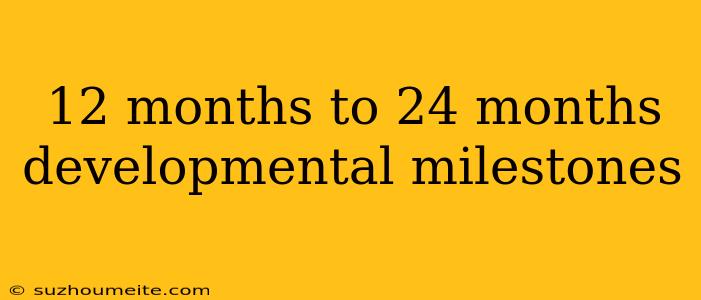12 to 24 Months Developmental Milestones
During the second year of life, babies undergo significant developmental changes. From 12 to 24 months, they progress from taking their first steps to becoming more independent and curious toddlers. Here are the essential developmental milestones to expect during this period:
Physical Development
12-13 months
- Walking independently: Your baby will start to walk on their own, although they might still be a bit unsteady.
- Improving balance: They will learn to balance while standing and eventually, while walking.
- Pointing and waving: Your baby will start to use gestures to communicate, such as pointing to objects or waving goodbye.
14-15 months
- Sitting down from standing: Your baby will learn to sit down from a standing position without support.
- Crawling up stairs: They will start to crawl up stairs, albeit slowly and with assistance.
- Throwing toys: Your baby will discover the joy of throwing toys and watching them fall.
16-18 months
- Walking up and down stairs: With support, your baby will learn to walk up and down stairs.
- Kicking a ball: They will begin to kick a ball forward, a significant milestone in their gross motor skills development.
- Dancing: Your baby will start to move their body to music, mimicking the movements they see around them.
19-24 months
- Running: Your baby will learn to run, although they might still be a bit uncoordinated.
- Climbing: They will start to climb uponto furniture, such as a couch or chair.
- Kicking a ball forward: Your baby will improve their kicking skills and start to kick a ball forward with more precision.
Cognitive Development
12-13 months
- Imitation: Your baby will start to imitate actions, such as clapping or waving.
- Following simple instructions: They will begin to understand simple instructions, such as "pick up the toy."
- Problem-solving: Your baby will start to use problem-solving skills, such as figuring out how to put a toy together.
14-15 months
- Understanding object permanence: Your baby will understand that objects still exist even when they're out of sight.
- Playing with toys: They will start to engage in more complex play with toys, such as stacking blocks.
- Memory recall: Your baby will start to recall memories, such as the location of hidden objects.
16-18 months
- Sorting objects: Your baby will begin to sort objects by shape, color, or size.
- Following routines: They will start to understand and follow daily routines, such as knowing that it's time for a bath or meal.
- Counting: Your baby will start to understand basic counting concepts, such as "one" and "two."
19-24 months
- Understanding cause-and-effect: Your baby will start to understand that their actions can cause specific reactions.
- Solving puzzles: They will begin to solve simple puzzles, such as fitting shapes into a board.
- Imaginative play: Your baby will start to engage in imaginative play, such as feeding a doll or making animal sounds.
Language and Communication
12-13 months
- Saying "mama" or "dada": Your baby will start to say "mama" or "dada" to refer to their parents.
- Babbling: They will engage in babbling conversations with themselves or others.
- Pointing to body parts: Your baby will start to point to their body parts when asked, such as "where is your nose?"
14-15 months
- Saying a few words: Your baby will start to say a few words, such as "no" or "bye."
- Understanding simple questions: They will start to understand simple questions, such as "what's your name?"
- Imitating words: Your baby will start to imitate words and phrases they hear around them.
16-18 months
- Saying around 20 words: Your baby's vocabulary will expand, and they will start to say around 20 words.
- Identifying objects: They will start to identify objects when asked, such as "where is the ball?"
- Following simple stories: Your baby will start to follow simple stories with one or two sentences.
19-24 months
- Using around 100 words: Your baby's vocabulary will continue to grow, and they will start to use around 100 words.
- Putting two words together: They will start to put two words together to form simple sentences, such as "mama go."
- Understanding simple games: Your baby will start to understand simple games, such as peek-a-boo or pat-a-cake
